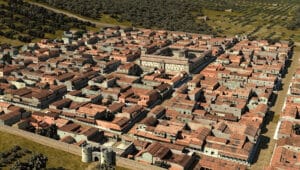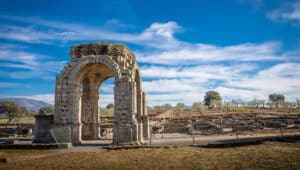Autumn descends upon Portugal like an old friend, bringing with it cooler, slower days. The oppressive heat recedes, and the countryside grows still. Vineyards, once full of grapes, now lie bare, and oak trees stand tall, stripped of cork and exposed to the fall breeze. The olive groves, too, seem to pause, their fruit still clinging to the branches, waiting for the harvest.
In the cities, life slows down as well. Lisbon’s streets are quieter now, as the number of tourists has dwindled. The sunlight is softer, and soon the air will be filled with the scent of roasted chestnuts from street vendors on every corner, adding to the season’s charm.
As November approaches, the leaves begin to change, turning from vibrant green to hues of amber and gold. This change occurs as chlorophyll – the green pigment responsible for the vibrant foliage – fades. Chlorophyll captures sunlight, converting it into energy, but as the days shorten and the air cools, its production wanes, revealing the rich tapestry of colours that lie beneath.
While science provides a clear explanation for this transformation, the ancient Greeks offered a more poetic narrative. They believed the leaves changed colour as Demeter, the goddess of the harvest, mourned the loss of her daughter, Persephone, who had been taken by Hades to the shadowy depths of the underworld.
Persephone was a beautiful maiden who spent her days in lush fields, surrounded by flowers. One day, while picking flowers in a meadow, the ground suddenly split open, and Hades, the god of the Underworld, emerged from the depths, abducting Persephone to make her his bride.
Demeter, upon realising her beloved daughter was missing, was overcome with grief. She searched the earth tirelessly, refusing to let the land flourish until Persephone was returned to her. As her despair grew, crops withered, fields turned barren, and the world plunged into famine. The gods began to worry, for without Demeter’s blessings, the earth could no longer sustain life.

Zeus, the king of the gods, knew that the balance of the world depended on Persephone’s return. He sent Hermes, the messenger god, to the Underworld to negotiate her release. Hades, however, had already offered Persephone a pomegranate, an act that bound her to his realm. According to ancient laws, anyone who ate the food of the Underworld was fated to remain there forever.
Yet Persephone had only eaten six seeds from the pomegranate, leading to a compromise. She would spend six months of the year with her mother, Demeter, on the surface of the earth, and the other six months with Hades in the Underworld. This agreement gave rise to the changing seasons.
When Persephone returns to her mother each spring, Demeter’s joy causes the earth to bloom once again. Crops grow, flowers blossom, and the world is full of life and abundance. This marks the season of spring and summer. However, when Persephone descends to the Underworld for her six-month stay with Hades, Demeter mourns, and her sorrow turns the land cold and barren, bringing fall and winter.
This cyclical pattern reflects the human experience, a poignant reminder of change, loss, and renewal. It illustrates the profound connection between life and death, growth and decay, and the inevitability of both.
In our modern understanding, we know that the seasons are governed by the tilt of the Earth’s axis. As our planet orbits the Sun, the northern and southern hemispheres alternate in basking in sunlight. When the northern hemisphere is inclined toward the Sun, it enjoys longer days and warmer weather. As time passes and the Earth continues its journey, temperatures grow colder, days get shorter, and trees shed their leaves. The ancient Greeks, however, saw the Earth as the centre of the universe and were left grasping for answers to the true causes of the seasons.
Yet, autumn in Portugal is not merely a time of loss. The temperatures remain mild, the sun still warm, and the landscape is bathed in a soft, golden light. The waves roll in strong, beckoning surfers to the coast, while hiking trails, national parks, and monuments become less crowded than before.
As I wander through the streets of Lisbon, usually alive with tourists, I find a quieter kind of magic. The vibrant colours of autumn continue to breathe life into the city, urging me to pause and fully appreciate the unique beauty that Portugal has to offer. Among the fallen leaves and the stillness of autumn, I’m reminded that this season is not about what’s lost, but about what’s quietly waiting to emerge.
|| features@portugalresident.com
Jay works for a private charter airline, and is also a UX designer and aspiring author who enjoys learning about history and other cultures

























